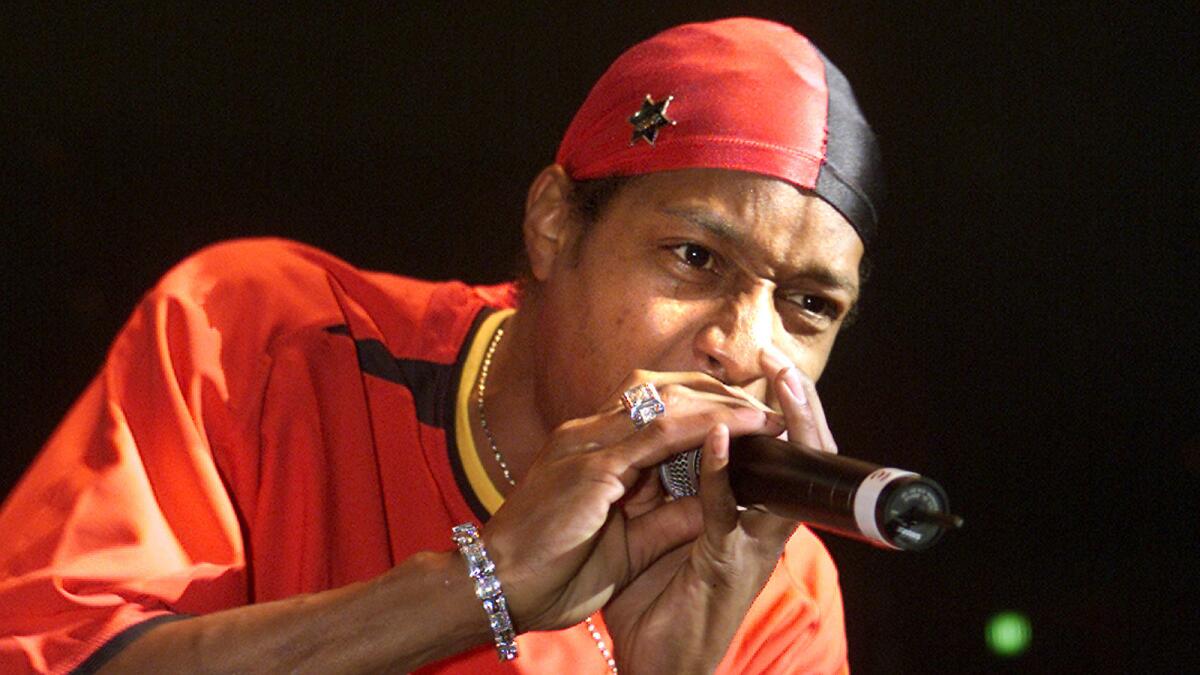California Sounds: Los Angeles Police Department issues another record, DJ Quik and Problem expand on ‘Rosecrans’ and Annie Hardy turns grief into art

DJ Quik
- Share via
Los Angeles Police Department, “Los Angeles Police Department” (Anti). Rest assured that if the real LAPD issued an album it’d be covered here, but the second full length by the artist who performs under that moniker, Ryan Pollie, sees him brashly wrest control from the Man without firing a shot.
On the contrary, Pollie’s delicate delivery but urgent sound makes it seem as though he sang, wrote and arranged his way into the Department. The album’s vibe suggests a Brian Wilson-sized ambition as songs fueled by piano, organ, strings and percussion illustrate Pollie’s skill with instrumentation.

“Grown” suggests “After the Gold Rush”-era Neil Young, and elsewhere you can hear hints of the psychedelic pop of the Flaming Lips and the baroque pop of Sufjan Stevens.
But Pollie’s not stuck in the past. “Plane 2” moves with a synthetic beat and a simple keyboard melody that blossoms into a surprisingly rhythmic dance track, and “The Birds” echoes like it was recorded in a dungeon. These are striking, expertly crafted songs containing left-field bridges and curious diversions, and the result is a memorable record from start to finish.
DJ Quik and Problem, “Rosecrans” (Diamond Lane/Blake Enterprises). Last year the veteran rapper and producer born David Blake teamed with Compton rapper Problem (Jason Martin) for an EP also called “Rosecrans,” but their take on the South Los Angeles thoroughfare holds too many stories for a mere mini-album.
“Rosecrans” includes the five EP tracks and adds a half dozen more. Combined, they find Quik, who across dozens of mixtapes and albums stretching back to 1991 has been a consistent voice in Los Angeles hip-hop, producing beat-based gems that draw from across the sound palette.
One of the central creators of the so-called “G-funk” sound that’s closely connected Dr. Dre, Quik’s tracks have become increasingly sophisticated over the years.
He works the Vocoder on “Bad Azz,” where it mingles with splashy snare drums and rubbery bass as guest rappers Dom Kennedy, Boogie and Bad Lucc celebrate the particulars of their respective awesomeness.
“Chachi’s Ride,” one of many tracks that mentions Los Angeles car culture, contains a South L.A. rhythm so archetypal it should be in the Smithsonian. (Warning: This song, embedded above, includes profanities.)
On “Straight to the City With It,” which appeared on the EP, Problem toasts Los Angeles — “Let’s hit the 105, see who’s really with it” — while celebrating the creativity and determination it takes to succeed here: “Check the check and go straight to the city with it/ High enough to see my whole city’s limits/ Silly gimmicks ain’t too many in my city with it.”
Annie Hardy, “Rules” (American Primitive/Full Cycle). The opening couplet of Hardy’s first solo album, tragically, sprang from real life: “Here comes the train to take my baby away.”
The singer and songwriter, who first earned critics’ attention in the ‘00s as vocalist for the alt-rock band Giant Drag, lost her infant son to sudden infant death syndrome in 2015 when he was 17 days old. Less than a year later, the baby’s father (Hardy’s boyfriend) died of a drug overdose.
From those opening lines, Hardy stares into the abyss of her losses, tapping the grief as a way to absorb the devastation. Make no mistake: This is raw stuff, and the artist seems to have no desire to couch her sadness and anger within distant metaphors.
The result is a record that approaches music with a Patti Smith-style determination: An artist powering through dark times by giving voice to the pain.
For tips, records, snapshots and stories on Los Angeles music culture, follow Randall Roberts on Twitter and Instagram: @liledit. Email: randall.roberts@latimes.com.
More to Read
The biggest entertainment stories
Get our big stories about Hollywood, film, television, music, arts, culture and more right in your inbox as soon as they publish.
You may occasionally receive promotional content from the Los Angeles Times.









